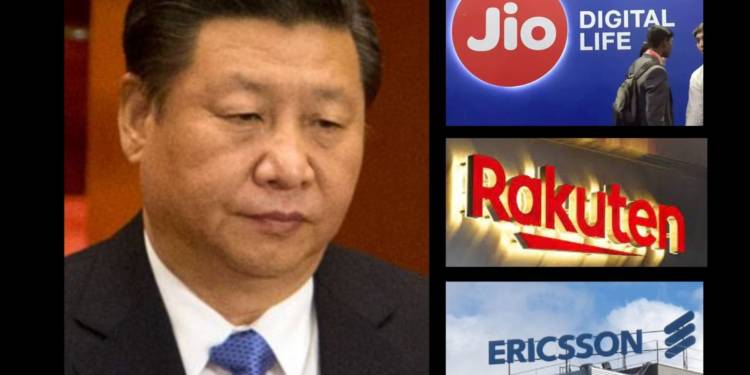The world’s future is with 5G wireless technology, but the world leader in this sector- Huawei is currently facing an exodus of sorts. Due to allegations of espionage and security threats, Huawei has lost many markets such as Singapore, Australia, the United Kingdom, and the United States. Its future also seems uncertain in Canada, Brazil, France and maybe even Germany.
With Huawei’s very own survival at stake owing to sanctions by the Trump administration, the world needs to look for options. European telecom operators– Ericsson and Nokia have instantly emerged as players that can replace Huawei. But there are other operators too who have emerged as Huawei alternatives.
Rakuten, a Japanese e-commerce giant founded in 1997, for example, is being seen as a viable alternative to the Chinese tech giant Huawei. Within India, Reliance Jio is being seen as a possible alternative for Huawei.
Those able to deliver quickly in 5G technology stand to benefit unprecedentedly because of support from the US President Donald Trump. The US that has been the undisputed king of the technological world today lags behind in terms of 5G technology. No major American company has been able to offer 5G technology.
Therefore, the only option left with Trump is to invest in non-American companies that can help him in weighing down Huawei. This has brought to life telecom companies that were once ruled out of the 5G technology race.
Nokia and Ericsson, for example, were written off from the 80 billion US dollars a year telecom equipment industry. But they have sprung back to life amidst increasing protectionism, security concerns, and suspicion against China. They were the natural choices that the world and the US looked up to when Huawei faced a massive onslaught.
Both these European telecom operators were world leaders in the rollout of 4G infrastructure. Thus, as Huawei gets shunted out, most of the telecom companies and countries are awarding their 5G projects to Nokia and Ericsson.
In fact, such has been the euphoria around the two European telecom giants that in February, the US Attorney General William Barr said that the US and its allies must consider taking a “controlling stake” in Nokia and Ericsson with the aim of counteracting the Chinese tech major Huawei.
But an open 5G market with a clear backlash against China’s Huawei is a road to glory that no one wants to miss. Asian telecom giants are ensuring that they are not left far behind. Japanese tech giant, Rakuten has therefore collaborated closely with American technology conglomerates in order to replace Huawei.
Rakuten has come up with the idea of an “open” Radio Network Access (RAN) technology. The e-commerce giant has already delivered on its promise of cheaper rates in its 4G network. The Japanese tech major plans on using just one vendor to support its entire RAN.
Tareq Amin, Chief Technology Officer, Rakuten Mobile says, “It is a single vendor strategy per domain, which allows us to achieve an easier way of how we do systems integration, and the cost is remarkable when you start separating hardware from software.” This hardware-software separation is what makes an “open” RAN different from a traditional one, in which both the hardware and software come from the same supplier.
If he has to choose between Tokyo and Beijing, Donald Trump will choose Tokyo which gives Rakuten a definite advantage. But there is another angle to Rakuten. Airspan, a Florida-based American company is going to fulfil Rakuten’s hardware requirements, along with Japan’s NEC.
Software is anyway more important for the kind of technology that Rakuten wants to sell. Many of the companies partnering with Rakuten are American such as Cisco and Mavenir. Rakuten hence creates a lot of room for Donald Trump. The US can easily associate the Japanese brand with ‘Buy American’.
The story of Jio, the digital platform of the Mukesh Ambani-led RIL isn’t much different. The biggest similarity being Tareq Amin himself. Amin who is now a key executive in Rakuten had earlier served as Senior Vice President of technology development at Reliance Jio. And therefore, we are not surprised by Jio’s vendor selections.
Jio is also partnering with Airspan, Cisco and Mavenir- all American companies. Similarly, Jio is also looking to cut network-related costs with the “open” RAN technology.
Jio is planning to roll out India’s first homegrown 5G network. Much like Rakuten, Jio also plans to emerge as a global, non-Chinese telecom operator. This is why when US President Donald Trump asked Reliance Industries chairman Mukesh Ambani about the 5G plans, Ambani proudly announced, “We’re going to do 5G. We are the only network in the world that doesn’t have a single Chinese component.”
Viable alternatives are thus emerging when it comes to replacing Huawei. European telecom majors- Nokia and Ericsson are natural choices. But it is the Asian options- Rakuten and Jio that seem futuristic and incredibly exciting.
Rakuten is an e-commerce giant which also wants to become a telecom major, while Jio is a telecom major that has also partnered with Facebook and also plants to enter the e-commerce market through Jio Mart. Rakuten and Jio could thus emerge as next-gen tech giants which exploit the intersection of data, e-commerce and telecom sectors if they win the 5G race.




























